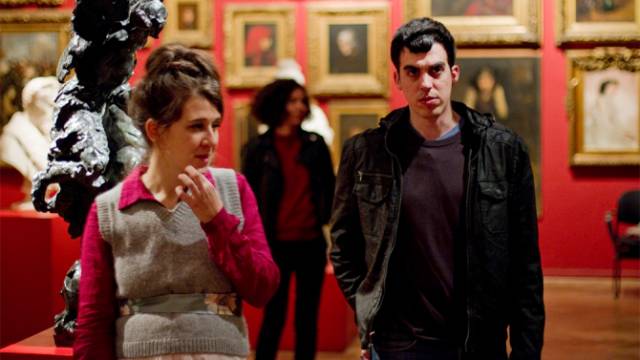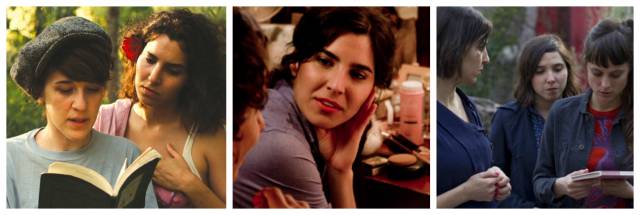

The Princess of France is Matías Piñeiro’s fourth feature length film, and the third consecutive project (if we include the short film Rosalinda) which he’s based on the works of Shakespeare. This unique take on Love’s Labour’s Lost takes place in the world of radio and has Victor (Julián Larquier Tellarini) returning to Argentina after a year abroad, in order to produce a radioplay with five women he’s involved with sentimentally. Emotional turmoil ensues as the characters try to produce a successful work of art while dealing with gossip, backstabbing and secrets. But this being Piñeiro, all of this unfolds with otherworldly, sensuous subtlety. Instead of having “big” scenes leading to dramatic climaxes, the characters use the very same Shakespearean dialogues they’re rehearsing to express themselves in the reality of the film.
But trying to describe the plot of one of Piñeiro’s films truly does his work a disservice, because they are so delicate and carefully constructed that they truly forgo traditional synopsis. They are films that need to be experienced, at times they feel like being caught in a dream. Making it safe to assume that no two people will ever have the same reaction to one of his films, regardless of how much Shakespeare they know. We had the opportunity to sit down with the director to talk about how he deconstructs Shakespearean texts, working with subtitles and how he sees the Bard everywhere.
You’ve mentioned that Orson Welles’ Chimes at Midnight was what first got you interested in Shakespeare. Considering that The Princess of France takes place in the world of radio, and that Welles was such a wizard in this medium, is there a connection between the two?
Not really, the radio thing came from a real life experience, but the film is influenced by Welles in the way that there is complete liberty in working with the text. We are not chained to the text, instead the text should help bring the best out of you. Welles’ adaptations of Shakespeare’s work indeed spoke to me, even before I read the plays.. The films led me to the plays. The radio element was inspired by one of my friends who told me she was doing a radio show which I knew nothing about, it also helped me find a way to see Shakespeare in a different way than I did in Viola which takes place in theatre. Radio made it less “dramatic”, it helped us see what goes on behind the scenes.
I guess I had Welles on my mind because of André Bazin’s theory that you can listen to Citizen Kane without the images and it works as a radioplay.
That’s really fascinating. It’s easy to forget how much care Welles put into the soundtrack of his films, because it’s not “visible”, but at least in that film the construction of sound is just as baroque as the images, which was something that didn’t happen in films of the era. Welles showed what’s possible in film, and you learn from that.
Can you talk about the way in which you give your characters jobs that in a certain way encompass the essence of who they are. For instance in Viola the title character is a messenger, and in Twelfth Night Viola is essentially a messenger as well. Similarly this one is set in a world of locution which sums up Love’s Labour’s Lost…
That’s what confirms you why you’re doing something. My friend told me about her radio show and I kept thinking about it, and how it would resonate with the play. I was interested in working with the different ways in which you can use voice in cinema, so radio made sense. There are scenes where there are four voices speaking at the same time for example, it’s this coherence that makes films make sense. It’s a series of little things that just happen, it’s not like sculpting a bust and doing it right in one try, you model it and shape it with time. Radio helped me focus on voices, I often shape my films based on the previous film, trying to do something different from what I’ve done before. In Viola I used a single voice-over, so in this one I wanted to multiply that. I also wanted to have a man at the center of the story.
Many people think that Shakespeare wrote everything that was supposed to be written and now we’re only seeing variations. As someone who’s become a Shakespeare expert do you often find yourself watching other films, or television shows, or theatre and going “oh, this probably came from this Shakespeare play!”?
I don’t think of myself as an expert, and I’m not trying to be modest, I just think that Shakespeare experts come from theatre or academia, which are not my fields. I’m much more of an amateur, I just love the text. In a way I’m profaning them, I’m more impertinent. When I watch American classic comedies I often find many traces of Shakespeare, I was watching Lubitsch’s Design for Living and saw a lot of As You Like It, he used different words but it was exactly the same structure in terms of dialogue, as well as the staging, where the director placed the characters.

In your work as an artist how do you discover yourself in Shakespeare’s works? What is it about Twelfth Night or Love’s Labour’s Lost that spoke to you as opposed to Macbeth for instance?
I specialized in the comedies maybe because I was very unfamiliar with them, people put more weight on Shakespeare’s tragedies than in the comedies. If you ask someone to name their top five Shakespeare characters I’m sure that none will be from a comedy, and out of those five probably none will be women. Maybe they’ll mention Lady Macbeth or Ophelia, but reading the comedies you realize that the female characters are much more powerful than the men. Female characters in the comedies are just as powerful as Hamlet. I was surprised that people hadn’t done more with the comedies, so I wanted to shed some light on plays that people might not be completely familiar with.
A few years ago there were two versions of Romeo and Juliet onstage in New York, as well as a new film adaptation and I realized that as an adult I was much more fond of characters that in the past I’d neglected like the Nurse or the Friar. Has that happened to you with Shakespeare’s works?
One often knows the tragedies without ever having read them, because they have been done in so many ways and many are used as metaphors to describe daily life. Once you actually read the plays you discover things that surprise you and renew your interest in them, that’s why I’ve never felt films replace their source material, instead they invite you to come closer to them. In Hamlet the plot of the play-within-the-play for example reveals comedic elements that make the entire play become even more ambiguous. Returning to the original text is always very stimulating.
You use many loops in the films and I was wondering if you’ve found a formula to make them work. How do you structure them?
I want to generate ambiguity with the loops, if you say the same thing twice, it might sound like the same thing but it has two different meanings. In Viola I wanted to change what I’d done in Rosalinda which also had actors rehearsing for a play, but didn’t involve repetition. I also needed to stay away from the “as if” in order to show a rehearsal that didn’t come off as fake, I couldn’t tell the actors “pretend you’re rehearsing”, you’re either doing it or you’re not. Film has a serious “realism problem” so I decided to include the rehearsals in the film and add an extra layer of fiction, for example I had a scene where the characters were rehearsing, but one of them decided to seduce the other by repeating the same line over and over. In The Princess of France I wanted to make a much more baroque film, so I wanted to use repetition as an element to break the diegesis, I wanted to cause a short circuit. So in the repetitions in the film I wanted to suggest the characters’ innermost thoughts, we see onscreen what a character things another character is doing. For instance I wonder how did you arrive to this interview, did you walk, bike, take the subway?
Interesting, I asked about this because I know that you teach film, and I believe your films are perfect tools to teach students about how to make cinema. They’re guidelines in a way. You show them about acting, directing, in The Princess you even devote a scene to showing how the characters record the sound effects they’ll use for their radioplay. However these scenes never come off as being didactic…
Exactly, it’s never Mister Know Nothing, but this has to do with realism. For example even though the play within the film isn’t real, I still need the characters to perform real actions. With this film I wanted to deconstruct Shakespeare, I wanted to expose the mechanisms, which also happen to make for beautiful scenes, for instance the scene where they record the sound effects are also great because the characters aren’t talking (laughs) which is something we need to balance the film. These scenes also write themselves, because they’re essentially documenting something that is actually happening, the actors are recording the sound effects. I avoid “as if” and show the steps you need to make this play happen.
You also avoid being too clinical in these deconstructions and I dare say you find magic in them. I can imagine someone who has never thought twice about sound effects become fascinated by this scene in The Princess of France…
Right.
As someone who has done some very unique Shakespeare adaptations do you find yourself feeling like you can appropriate them?
Not really, I feel those works have something that spoke to me, but they’re a very intimate relationship between me and the play. If there’s someone you can’t appropriate it’s Shakespeare because he’s everywhere, it would be quixotic to try and appropriate him. I don’t often think of my films as Shakespeare adaptations but variations, because I’m using fragments, I never do the “official” adaptation.
When people think of Shakespeare in cinema they think of Branagh, Olivier and Welles, all of whom did very serious adaptations. Were you interested in doing a more populist Shakespeare?
Not really, my calling came from monologues that inspired me and which I thought should be shared. I wanted to share more than I wanted to sculpt an extremely beautiful object and place it on a shelf for others to admire. I wanted to share the pleasure I got from the text, and I also wanted to show my relationship with my actresses, because I feel in each play I’ve found something in the characters that made me think of the actresses playing those parts in the films. About fifteen years ago Editorial Norma published Shakespeare translations done by Latin American authors, and reading those versions allowed me to come close to them, they weren’t annotated, so you were able to read them the whole way through. They were so different from translations made in Spain for instance, which made them even more accessible. I think I learned what I wanted to do from those translations, when I write the screenplay I obviously retouch them a little bit. Also watching Shakespeare adaptations on film you see the difference between how Olivier and Welles worked, Welles was much more Bazan-ian, he didn’t change the meaning of the text, but he wasn’t afraid to cut them and exposing his own limitations. You realize it’s not necessary to include every single letter, Branagh’s complete Hamlet obviously has its merits, but I don’t think that’s the point of adapting. I wasn’t interested in making them vulgar either, including slang would’ve been distracting. This freedom makes it easier to profane the text, in order to adapt it you have to violate it.

Are there elements of yourself in Victor? He’s a very Felliniesque character surrounded by women and trying to get out of a mess he caused himself.
I use real life elements, like the radio show, the play they were doing...but beyond that things are much more kaleidoscopic, everyone has elements from everyone else. My biography can be the raw material, but there are many ways to execute it for dramatic purposes. There’s also something about my characters’ jobs, I’m not really interested in transposing the texts, like doing As You Like It in a factory for instance, so instead of going to the woods they’d go to the basement. There are films that have done this effectively, like My Own Private Idaho, but it’s now what I wanted. So in trying to find a more realistic background, having them play actors made sense. With Victor it’s a special case because he’s the first time I’ve had someone play a director figure, when in most cases I’m the director, so I didn’t want him to come off as fake by having him say things I would say when I’m directing. Perhaps the most direct link between me and Victor is that like him I was gone from Argentina and I came back to do this film. I don’t have any of the romance drama though (laughs)...
I’m a native Spanish speaker and I’ve watched all of your films in the US, so it means they always have English subtitles, added to this your actors have Argentinean accents and they’re doing Shakespeare, so it becomes a very interesting mix of languages. In The Princess of France you also have a scene in Italian, which I understand…
Wow, you’re the ultimate viewer (laughs)...
I’m mentioning this because I wanted to know how has your relationship with Shakespeare changed since you’ve been living in New York City, which granted isn’t an “English only” city, but still has much more English speakers than Buenos Aires for instance.
To be honest the thing that affected me the most were the subtitles (laughs) I had to rethink where the subtitles would go. Subtitles are no small thing, they are very important, the speed between the words and the images can sometimes lose people. Something about living here made much more conscious of subtitles, in The Princess of France I’ve been much more involved in the subtitling process, it was almost like directing the film all over again. Things like having a subtitle disappear just in time for audience members to see a look...subtitles became another element instead of being an afterthought. It was crazy. Since I was doing Shakespeare I also knew how important the text was so I did my best to preserve (does air quotation marks) the original. In fact my concern with subtitles was what sparked the idea for the first scene in the film which is completely in Italian, it was basically a scene that couldn’t not be subtitled. The film now always has two languages so it means it will always have subtitles regardless of where they’re watching it. In this scene the subtitle is no longer subtext, it becomes the text itself.
The Princess of France is now playing in select theaters.